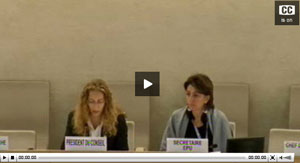UN review puts Irish human rights record under scrutiny
Resource type: News
The Irish Times | [ View Original Source (opens in new window) ]
MARK KELLY
Thu, Oct 06, 2011
OPINION: MINISTER FOR Justice Alan Shatter and senior officials are in Geneva today, facing a series of tough questions posed by our European neighbours and by other UN member states on Ireland’s human rights record.
The hearing forms part of Ireland’s first universal periodic review by the UN Human Rights Council. Unique among the UN’s monitoring processes, it allows UN member states directly to scrutinise the human rights records of their fellow nations.
The review is really a process that culminates in Geneva – preparations for today’s hearing have been under way for more than a year. The Government has prepared its own universal periodic review report, the UN has drawn up a summary of all of its previous human rights recommendations to Ireland and it has compiled a “stakeholder compilation report”, synthesising more than 60 submissions from Irish civil society, as well as from the Irish Human Rights Commission.
The Irish Council for Civil Liberties and 16 other non-governmental organisations and trade unions have been working under the Your Rights Right Now campaign banner to ensure that the most important human rights issues facing modern Ireland are highlighted for the UN, and put directly to the Government on this international stage. Nationwide, Your Rights Right Now consultations and 84 written submissions have resulted in a report to the UN endorsed by over 100 organisations.
This report is a call to action to the Government – a list of reforms sorely needed and long overdue. These include the need for constitutional protection of children’s rights; family law reform; modernised penal policy; the overhaul of our Victorian mental health legislation; legislating for access to therapeutic abortions where the life of the mother is in danger; and the implementation of key UN treaties such as the Optional Protocol to the Convention Against Torture and the Convention on the Rights of Persons with Disabilities.
None of these represents a new problem, each of these issues, and many more, have been discussed and analysed for decades. We know the solutions – all it takes is moral and political courage on the part of the Government to make it happen. Successive governments have failed to show this courage. The universal periodic review process is the opportunity for the current Government to commit on the international stage to improving human rights in Ireland in law, policy and practice: in deeds, not just in words.
To encourage such a commitment, Your Rights Right Now representatives have been intensively lobbying diplomatic representatives of the countries who today will question Ireland. The impact of our work is already clear. Our report is referenced 30 times in the UN’s own 11-page stakeholder report and its content is reflected in many of the questions submitted to Ireland in advance of today’s hearing. Today’s questions to Ireland include:
Finland and the UK: what progress is being made to create effective national bodies to monitor conditions in places of detention?
Finland, the Netherlands, and the UK: how does the Government intend to improve the protection of children’s rights and formally recognise modern, pluralist and inclusive family relationships?
Denmark, Finland, the Netherlands, Norway, Slovenia and UK: will the Government legislate to clarify the circumstances in which abortion may be lawful (as required by the 1992 Supreme Court judgment in the X case and the 2010 judgment of the European Court of Human Rights in the case of A, B and C v Ireland)?
Czech Republic: will the Government grant ethnic minority status to the Traveller community?
The Netherlands: what steps has the Government taken to ensure austerity measures do not disproportionately impact on the most vulnerable in Ireland?
Norway: is Ireland prepared to enact legislation to underpin the right of collective bargaining?
The Government has a strong vested interest in taking UN monitoring processes seriously, as Ireland is running for election to the UN Human Rights Council. It faces tough opposition from alternative candidates including Germany, Sweden and the US, so a convincing review performance could provide a major boost.
States usually demonstrate their good faith in UN monitoring processes by making “voluntary commitments” at the beginning of their universal periodic review hearings. Will the Government commit to long-overdue reforms? Will it put mechanisms in place to implement UN human rights recommendations? Will it replace the current State-funded human rights and equality bodies with a genuinely independent and properly funded alternative?
Shatter can and should use this international forum to make such “voluntary commitments”, to grasp the nettle and address the human rights problems facing our country.
Mark Kelly is director of the Irish Council for Civil Liberties and chairman of the cross-sectoral steering group of Your Rights Right Now. A live webcast of today’s 8am-11am hearing is at rightsnow.ie, with public screenings at Dublin’s Liberty Hall and in Limerick and Cork
In the Media
> State questioned over progress on human rights, The Irish Times, 06 October 2011
> Shatter to be quizzed on human rights obligations, Irish Examiner, 6 October 2011
Ireland’s UPR Hearing
> Watch footage of Ireland’s UPR hearing, split into bite size segments.
The Irish Council for Civil Liberties and Your Rights.Right Now coalition are Atlantic grantees.
